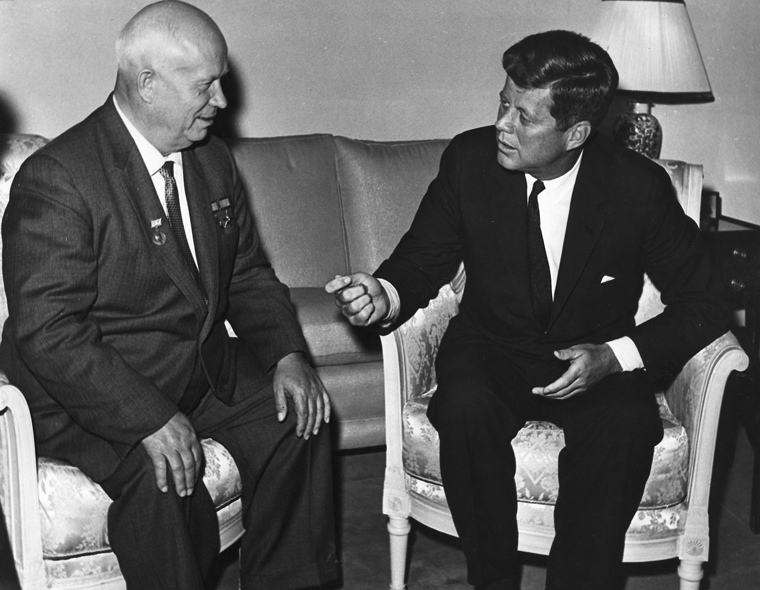
It should be the keen hope of everyone that Donald Trump’s engagement with Kim Jong-un in Singapore leads to denuclearisation of the Korean peninsula. If Trump can untangle one of the world’s most obdurate security dilemmas, his critics would have to acknowledge the effectiveness of his irregular and unconventional approach to foreign affairs. But summits are tricky.
An earlier summit between another volatile but determined communist dictator and a newish president—the 1961 Vienna meeting between President John F. Kennedy and Premier Nikita Khrushchev—might cast some light on what’s at stake and some of the issues.
Frederick Kempe in
Berlin 1961 writes that in the personality profiles prepared for Kennedy on coming to office, Khrushchev is pictured as a ‘chronic optimistic opportunist’, possessing ‘resourcefulness, audacity’ and ‘a touch of the gambler’s instinct’. Kennedy had been in office for 135 days when the meeting took place.
There are some other superficial parallels. Germany was a divided nation like Korea. Hostilities had ceased 16 years before, but no peace treaty was in place. Khrushchev believed that the Soviet refusal to release captured US airmen before the election swayed it in favour of Kennedy and against Nixon. He later freed them as a gesture of goodwill to the new incumbent. Even fake news was present. Russian media reported non-existent large welcoming crowds for a Khrushchev visit to New York.
There may be a deeper analogy. Khrushchev’s earlier actions to ‘cut back on the military and reduce international tension’
contributed to his downfall when his peers and colleagues saw them as ‘undermining the country’s security’. Khrushchev’s push for ‘
peaceful coexistence’ eventually imperilled the powerful communist autocrat’s hold on power. Likewise, Kim will be extremely cautious about making impulsive concessions without adequate compensation for fear of weakening his leadership.
The differences are also great. The preparations for Kennedy’s meeting with Khrushchev were extensive. Diplomatic, policy and national-security experts within the administration assiduously and rigorously prepared numerous
position papers and
assessments to support the president. The Vienna summit addressed issues far broader and more complicated than those between Trump and Kim, and the consequences of failure were far graver. But one stood out: Berlin.
A
briefing paper for the Vienna summit noted that any setback on Berlin ‘would be quite intolerable and unacceptable to a great power, no matter what the consequences’. However, the president was supported by an immensely talented and well-credentialed team. Dean Acheson, Charles Bohlen, McGeorge Bundy, Averell Harriman, George Kennan, Paul Nitze, Walt Rostow and Henry Kissinger, among others, collaborated and contested over policy advice on the Berlin problem for the neophyte president. And
Kennedy worked hard.
Not only does the Trump administration lack this calibre of experienced support, especially given
the decimation of the State Department, but the president also seems
disinclined to seek professional or expert advice or to apply himself to mastering the policy details. When, in the wake of the failed Vienna talks, Acheson
articulated a detailed argument for Kennedy on why the US should be prepared to instigate a nuclear war over Berlin, the president was knowledgeable enough to seek other opinions, including from
Arthur Schlesinger. Trump seems to lack that option.
The Vienna summit still went badly for Kennedy—not surprisingly, given
the background and complexity. Khrushchev took the initiative, threatening to sign a separate peace with East Germany (and with West Germany if it wished), irrespective of the impact on the presence of the Western powers in Berlin. This would
effectively explode the Potsdam agreement on postwar Germany. Then, only two months later, the East German police began to obstruct movement between East and West Berlin and
started building the Berlin Wall.
What could go wrong for Trump? The biggest risk resides in Trump’s conviction that establishing personal relationships is primary. Kim’s grip on power depends on delivering outcomes and not departing from the ideological line. Like Trump, he has a domestic constituency. If the president doesn’t appreciate that Kim needs to demonstrate success on security and economic issues, a deal could prove elusive.
The processes of denuclearisation, including the exhaustive exercise of decommissioning weapons and dismantling the infrastructure and capacity required to restart weapons acquisition, are highly technical. Without detailed comprehension, Trump might sign up to a less than adequate deal.
If he approaches the meeting with a single objective and without an appreciation of the potential geopolitical opportunities for China and Russia from denuclearisation of the peninsula, any success could be pyrrhic. Undoubtedly, Russia and China are poised to invest in North Korea if sanctions are lifted. They will be keen to bolster their maritime presence in the East China Sea and the Sea of Japan.
The weight here will fall on Mike Pompeo and John Bolton and their teams. It’s not clear how much expertise, knowledge, sophistication, subtlety and strategic capacity is available to Trump or how open he is to advice. While North Korea isn’t the Soviet Union, and there’s no existential threat to the US, the results of the summit will have important consequences for US leadership, regional security, and Trump’s personal standing. The final risk is that Trump will settle for a headline rather than a substantive outcome.
History doesn’t repeat as the initial conditions are never the same. However, the record shows that normally when political leaders engage in complex international negotiations they draw on those around them with the greatest expertise and experience for support. This has proven important even when summits are unsuccessful and skill, knowledge and experience are required to deal with the fallout. Policy competition generally trumps obsession. Singapore will be a test of a wholly different approach.
 Print This Post
Print This Post